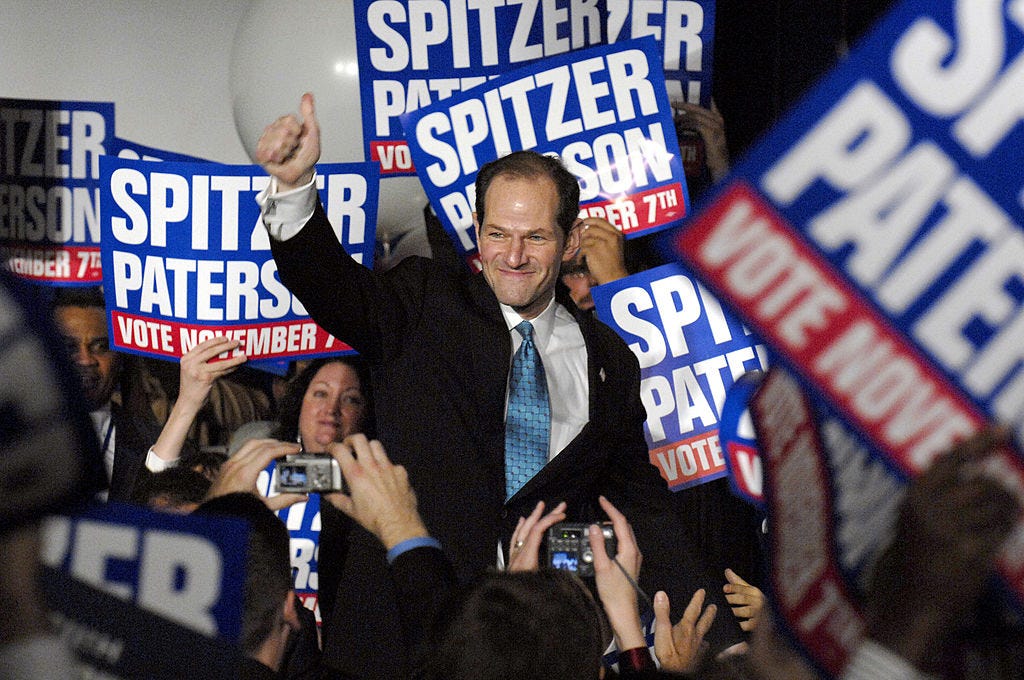The Tragedy of Eliot Spitzer
What could have been
Tucked into William Finnegan’s nuanced account of the saga surrounding Madison Square Garden and the quest for a new Penn Station in the latest issue of the New Yorker is a surprising bit of reportage about Eliot Spitzer, the former New York governor. It was surprising to me, at least, because Spitzer’s downfall predated my serious political awareness. As a high school student, I hardly followed local politics at all, and didn’t care much more when I entered Stony Brook University. I remember a freshman journalism class discussing, briefly, his sudden resignation. I can’t recall participating to any particular degree. Finnegan explains, with able precision, why New York has failed so spectacularly to build a functional train station in Midtown Manhattan, laying the blame on multiple governors, James Dolan, and other public officials. But it was Spitzer, Finnegan writes, who nearly got Dolan’s Madison Square Garden to move, allowing for the construction of a better Penn Station. “The Garden actually signed a memorandum of understanding with developers. Then Spitzer self-destructed in a prostitution scandal, and M.S.G proceeded to Plan B, which was an expensive renovation of the increasingly shoddy arena.”
Spitzer’s tenure as governor lasted about 14 months. Elected in a landslide in 2006, he was forced from office in a prostitution scandal, avoiding criminal prosecution, probable impeachment by Democrats in the State Assembly, and a trial in the Republican-run State Senate he’d lose. Famously, Spitzer deemed himself a “fucking steamroller” and warred with the legislature much of his first year, his approval ratings steadily declining. Assembly Democrats, in particular, reviled him. Had there been no prostitution scandal, it’s entirely unclear how he would have fared in the rest of his term. But given how hard it is, in New York State, to defeat incumbent governors—one hasn’t lost a re-election bid since 1994—it’s likely that Spitzer could have won again in 2010, had there been no scandal. The unremarkable George Pataki, a Republican, governed for 12 years. After his resignation, Spitzer was derided in the press as the “Luv Gov” and most political observers wrote him off. He attempted a comeback in 2013, running for city comptroller. Squandering large polling leads, he fell to Scott Stringer in a close Democratic primary, with most of the city’s political establishment aligned against him. At the age of 54, his political career was definitively over.
What if Spitzer had somehow been governor for as long as Andrew Cuomo, who lasted nearly 11 years before resigning from his own sex scandal? What could have been? Spitzer, who was once talked about, quite credibly, as a candidate to be America’s first Jewish president, may well have ended up as one of the more consequential governors in New York’s history. Politically, he could have built up New York’s Democratic Party into a national leader. It would not have devolved into the laughingstock it is today. Spitzer, in many ways, was the kind of old-world New York politician that has mostly vanished in the me-first froth of twenty-first century wealth-building; the scion of a real estate empire, Spitzer always preferred public service, and like other patricians before him—Franklin Roosevelt and Nelson Rockefeller come to mind—he was interested in wielding tremendous power, generally, for the public good. Riverdale-sprung and Ivy League-educated, Spitzer worked in the Manhattan DA’s office and relied on his family’s wealth to make two bids for state attorney general. He lost badly in 1994 and won narrowly in 1998.



